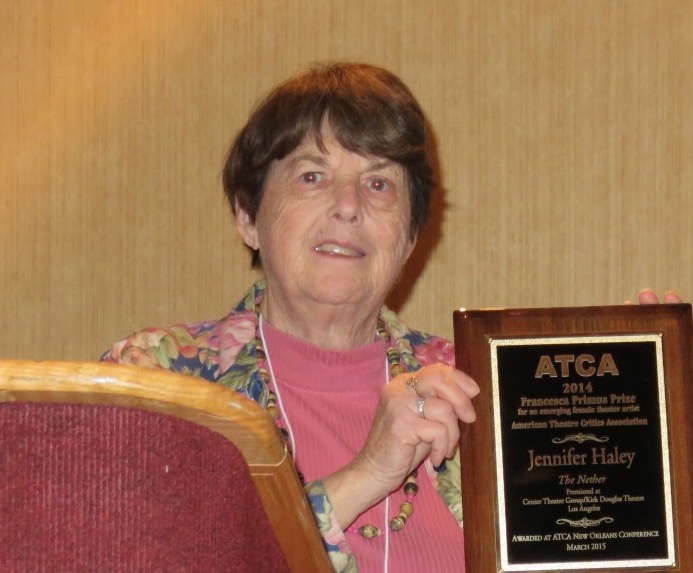Barbara Bannon [1939 – 2018]
Barbara M. Bannon, the longtime secretary of the American Theatre Critics Association (ATCA) executive commitee, who reviewed theatre in Utah for more than four decades, died on Thursday, October 11, 2018 at the Huntsman Cancer Institute following a protracted battle with pancreatic cancer. She was 79.

Bannon was a writer and theatre critic for several publications, most notably The Salt Lake Tribune since 2004. In addition to her writing, she was an editor and proofreader for Utah State University and taught grammar, punctuation, editing and proofreading courses at the University of Utah. She was the owner of Hither and Yon Editing and Publishing Services and was a freelance editor for Peregrine Smith Books.
Bannon enjoyed writing about the arts and in addition to her love of theatre frequently wrote about film. Her keen eye and skills in editing and proofreading led her to be hired as the editor of the Sundance Film Festival program for the past 26 years.
In its obituary of Bannon, The Salt Lake Tribune cited Ellen Weist, an editor and one of her colleagues, as remembering that Bannon would specifically write her reviews in longhand before editing them over computer.
Bannon was enormously supportive of the many budding actors she met throughout her years of reviewing theatre and whose performances caught her attentive eye. Following the announcement of her death, a number of them reminisced over social media that her confidence served as a source of inspiration for them to more actively pursue careers in theatre.
Because of her close friendship to the late theatre critic Francesca Primus, Bannon was the founder and leading advocate for the Francesca Primus Prize, a $10,000 annual prize administered by ATCA and given to an emerging female playwright. It was one of her proudest achievements.
Bannon was a mainstay on the ATCA executive committee and wrote detailed and extensive notes for her minutes as secretary. Although she maintained her own opinions, she was careful not to inject much subjective thought into many of their detailed discussions.
She relished gathering in various cities with her fellow ATCA members at the annual conferences and frequently attended the mini-conferences held in New York, rarely missing one, even after she received news of her cancer diagnosis. Bannon had designated the schedule of her treatments be spread around so they would not interfere with her review work. She was an attendee at the most recent ATCA conference in Spring Green, Wisconsin held in mid-July.
Born on Jan. 3, 1939, in Stamford, Connecticut, Bannon graduated from Trinity College in 1960 and earned her master’s degree in speech and drama from Catholic University in Washington, DC in 1963.
Following her obtaining a teaching certificate from Fairfield University in Fairfield, CT, she went on to become an English teacher at Regina High School in Hyattsville, MD. According to The Washington Post, one of the students she inspired was Mercedes Ruehl, who went on to win the 1991 Tony Award for Best Actress in a Play and the 1992 Academy Award for Best Supporting Actress.
Bannon moved to Utah in 1968, finding work initially at the ski resort town of Alta. Eventually she was hired to work as a writer for Utah Holiday Magazine in 1977, where she rose over time to become managing editor.
After that publication was shuttered in 1993, Bannon continued to work in the Salt Lake City area as a freelance theatre critic and became a member of ATCA during this period.
A lifelong Catholic, Bannon was a proud lay Dominican and attended worship services at St. Catherine of Sienna Newman Center, where she was a member of the choir.
Bannon is survived by her brother, Michael Bannon of Bartlett, NH. A prayer service will be conducted at St. Catherine of Siena Newman Center, 170 S. University Street in Salt Lake City on Friday, October 19 at 6:00 p.m. A Mass of Christian Burial will follow at 6:30 p.m. A celebration of her life follows the burial.– Alan Smason
Some Personal Reflections
From Barbara’s Colleagues
Her affect on Utah theater was significant, said playwright Julie Jensen. “Her life was an inspiration. As a reviewer and advocate for playwrights, new plays, and good work, her contribution to the Salt Lake City arts scene was large, deep, wide and incomparably important. Her writing was always informed, incisive, and sometimes even inspiring. There was never a person with a more important voice, fresher ideas, or more solid sense of the theatre. That we will miss her is an understatement. She is irreplaceable in every sense.”
Russell Warne, who wrote eloquently about how she took him under her wing, said on a broader canvas, “I will always remember Barbara Bannon as the matriarch of arts journalism and criticism in Utah. When she was forced into retirement from the Salt Lake Tribune, it was a devastating blow to the arts in Utah. Barbara believed in the arts and their power to enrich the lives of all people. She wanted to like every show she attended, and that hope for a good experience taught me how to approach plays that I review. Barbara leaves a heritage of appreciation for the arts that I will work to keep alive for many years. She had high standards for thinking and writing about the arts that I will strive to live up to.”
In an organization known for its socially-awkward and shy members, Bannon had a nurturing ability to make newcomers and old friends feel welcome appreciated, greeting many of us with hugs. Scores of colleagues expressed their gratitude in their tributes.
“I am glad I was able to give her gentle hugs at our meeting in Spring Green,” wrote Martha Wade Steketee. “Her quiet wit and gentle corralling of our boisterous barely containable critic souls is already missed.”
Lynn Rosen added, “She was truly a rudder of not only criticism at large, but of the ATCA organization as a whole. That “she will be missed” only exhibits a paucity of words to express the enormous cavern left in her wake.
“We have lost our ever so gentle “Grandma Bear” of ATCA,” wrote Jack Lyons. “Barbara was beloved and a quiet force for following the rules of ‘engagement’ when it came to creating sense amid chaos and hyper insanity, when writers and critic’s egos collided. She was a rock of an ATCA members who went above and beyond for the organization. We were so lucky to have her as long as we did.”





Sorry, the comment form is closed at this time.